Edie Melson's Blog, page 22
March 7, 2025
The Challenge of Getting in My Right Writing Mind

by Beth Vogt @BethVogt
I am not a pantser.*
I write those words without apology to all the pantsers out there.
“But Beth,” you say, “That’s not very nice.”
It’s not about being nice but about being honest. I’ve been living the life of a pantser for months now and it’s made me bonkers.
There’s the honesty again, writing friends.
I’ve always been a plotter* , so why was I pantsing my story? Desperation. Sheer desperation. Writing has been a slog for months and to get words on the page, I decided to write something … anything … whatever came to mind.
Did I get words on the page? Yes. Goal accomplished.
But the process was like sitting down to write and then throwing my pages on the floor when I was done. The next time I sat down to write, I’d pick up those scattered pages and start to write again. No need to organize my completed pages. Just go.
I wrote a fun scene because, well, it seemed like (ahem) a fun thing to do. I wrote some of the manuscript’s middle scenes. I wrote a couple of climactic ending scenes.
I was lost, lost, lost in all that increasing word count.
Until …
I decided to get in my right writing mind.
A weekend away afforded me hours of uninterrupted time with my fictional characters. But rather than focusing on writing some new scenes, I backed up and plotted my story. What did that look like?I read through my manuscript and listed my chapters, breaking them down scene by scene and point of view (POV). I created a timeline for my story, noting both the specific date and the time of day. (My novella takes place over a single month.)I listed the scenes I needed to write or rewrite.I started a side list of notes I needed to remember, including name changes and overlooked elements to weave into the story. I reworked my hero’s Dark Moment Story (DMS) because the original one wasn’t “pinging” for me.
By the time I was done, I was a happy writer. All the virtual scattered papers? Stacked neatly in my head. The next time I sat down to write, I opened my manuscript, looked at my list of scenes to rewrite … and I wrote.
It was as simple as that.
The next time writing is a slog (because yes, I know it’ll be a struggle again) I’ll know to stick with plotting before I write.
What about you? Are you a plotter or a pantser? Maybe a bit of both – a plantser*?
*pantser: a writer who writes without an outline, meaning they “fly by the seat of their pants” when they write a story *plotter: a writer who uses an outline when writing their story *plantser: a writer who does a bit of both , but usually prefers one method more than the other
TWEETABLEThe Challenge of Getting in My Right Writing Mind from @BethVogt on @EdieMelson (Click to Tweet)
 Beth K. Vogt believes God’s best often waits behind the doors marked “Never.” She’s authored 15 novels and novellas, both contemporary romance and women’s fiction. Beth is a Christy Award winner, an ACFW Carol Award winner, and a RITA® finalist. Her newest contemporary romance novel, Dedicated to the One I Love, released June 20, 2023. Her novel Things I Never Told You, book one in her Thatcher Sisters Series by Tyndale House Publishers, won the 2019 AWSA Golden Scroll Award for Contemporary Novel of the Year. An established magazine writer and former editor of the leadership magazine for MOPS International, Beth blogs for Learn How to Write a Novel and The Write Conversation and also enjoys speaking to writers group and mentoring other writers. She lives in Colorado with her husband Rob, who has adjusted to discussing the lives of imaginary people. Connect with Beth at BETHVOGT.COM.
Beth K. Vogt believes God’s best often waits behind the doors marked “Never.” She’s authored 15 novels and novellas, both contemporary romance and women’s fiction. Beth is a Christy Award winner, an ACFW Carol Award winner, and a RITA® finalist. Her newest contemporary romance novel, Dedicated to the One I Love, released June 20, 2023. Her novel Things I Never Told You, book one in her Thatcher Sisters Series by Tyndale House Publishers, won the 2019 AWSA Golden Scroll Award for Contemporary Novel of the Year. An established magazine writer and former editor of the leadership magazine for MOPS International, Beth blogs for Learn How to Write a Novel and The Write Conversation and also enjoys speaking to writers group and mentoring other writers. She lives in Colorado with her husband Rob, who has adjusted to discussing the lives of imaginary people. Connect with Beth at BETHVOGT.COM.
Published on March 07, 2025 22:00
March 6, 2025
Why Contracts Matter If an Author Plans to Self Publish

by A.C. Williams @ACW_Author
What happens when your publisher shuts down? More and more authors are turning to self-publishing as a way to resurrect their titles after their press has closed.
Last month we talked about how important it is to know your career goals before you re-publish a book ( Why Do You Want Your Book to Be Re-published) . Once you decide to move forward with self-publishing, you’re on your own with your business plans. No one is going to design a marketing strategy for you, so you need to do it. But making the plan is only the first step. You might think that the next step is moving forward with publishing your book, right?
Wrong.
Believe it or not there are more questions to ask, and almost all of them are legal questions. Don’t skip this. If there is any part of this series that is more important than the others, it’s this one. You need to know what rights you have concerning your manuscript.
Ideally you would have already sorted this out in advance, but in many instances I’ve heard of, authors don’t get a lot of notice before a press closes. You may not have any leeway to negotiate your rights.
Before we get into this, a disclaimer: I am not a legal expert. If you need more information, please consult a professional. I can only tell you what I have learned, and every situation is different. So if something in this post sparks a thought in your brain, please check it out in the context of your own situation, and don’t hesitate to bring in a legal expert. This stuff gets really complicated really fast.
For your sake, I hope you already negotiated your rights before you signed with your publisher, but if you don’t have an agent, you may not have known what you could ask for. You may not have known what you should ask for. And if you were working with a very small press, they may not have even give you a real contract.
So the first step in this process is to review your contract. Look for any legal documents that passed between you and your publisher as you worked with them to get your book published.
If you don’t have a contract, that may be something you need to discuss with a lawyer. If you are still in contact with the people who published your book, email them to ask for a document that indicates you are the owner of the manuscript and all its associated rights. There is a chance you will be asked for that document, and if you don’t have it, you could get in trouble when you republish your book.
But I’m going to assume that you had a contract. Most reputable publishing houses do.
Make sure all rights to your manuscript have reverted back to you, the author. Make sure that you can print and distribute your book in any format at any time or place that you decide. Make sure that your publisher did not retain ownership of the manuscript in any way.
If they did, contact a lawyer. But, again, if they are at all reputable, usually all print rights and distribution rights should have been returned to you as the author. And they shouldn’t have claimed ownership or copyright on your manuscript to begin with. You will likely need to pay a fee to obtain the formatted documents and your cover art, if you want it.
I am aware of some publishers that retain ownership of the edited manuscripts and not the unedited ones. Purchasing the edited manuscript sometimes can cost the author a pretty penny. You can have your manuscript back, just not with any of the edits included. This might not be a deal breaker for you, but if your book had extensive edits, it could make a difference.
This is the primary reason why you always, always, always need to check your contract carefully before you sign it. It’s not that you doubt a publisher’s integrity; they are doing business, and so are you. You have to be clear on what they will do for you and what they won’t.
It all comes down to the contract. So for those of you who haven’t published traditionally yet, pay attention. Don’t just take a publisher’s word for it. Read your contract. Know what’s in it. You have no control over when your publisher might have to close. If you’re fortunate, they will communicate with you and be willing to work with you if they do. But make sure you are protecting yourself with the contract first, and if you have any concerns or worries or questions about a contract, ask.
Ask them to clarify it. A major red flag is a publisher that doesn’t understand the implications of their own contracts. And if they can’t explain it in a way that makes sense, talk to a legal expert.
Contractual language can be difficult to read, so if you’d rather not learn how, get in touch with someone who can. There are many books on writing contracts and negotiating contracts that you can read, and there are even classes you can take to learn how to navigate contracts.
Once you determine that you have print rights and distribution rights for your manuscript in all formats (paperback, hardback, ebook, audiobook, etc), then you can proceed. Get an official reversion of rights document from your publisher, and then you can take the next step toward getting your book back into the hands of your readers.
Just remember, don’t sign your name to something you don’t understand. You don’t have to be an expert on contracts, but it’s worth investing some time to make sure there are no surprises waiting for you if your publisher has to close.
TWEETABLEWhy Contracts Matter if an Author Plans to Self Publisher from @ACW_Author on @EdieMelson (Click to Tweet)
 A.C. Williams, also known as Amy C. Williams, is a coffee-drinking, sushi-eating, story-telling nerd who loves cats, country living, and all things Japanese. Author of more than 20 books, she keeps her fiction readers laughing with wildly imaginative adventures about samurai superheroes, clumsy church secretaries, and goofy malfunctioning androids; her non-fiction readers just laugh at her and the hysterical life experiences she’s survived. If that’s your cup of tea (or coffee), join the fun at www.amycwilliams.com.
A.C. Williams, also known as Amy C. Williams, is a coffee-drinking, sushi-eating, story-telling nerd who loves cats, country living, and all things Japanese. Author of more than 20 books, she keeps her fiction readers laughing with wildly imaginative adventures about samurai superheroes, clumsy church secretaries, and goofy malfunctioning androids; her non-fiction readers just laugh at her and the hysterical life experiences she’s survived. If that’s your cup of tea (or coffee), join the fun at www.amycwilliams.com.
Published on March 06, 2025 22:00
March 5, 2025
Breath Prayers for Writers
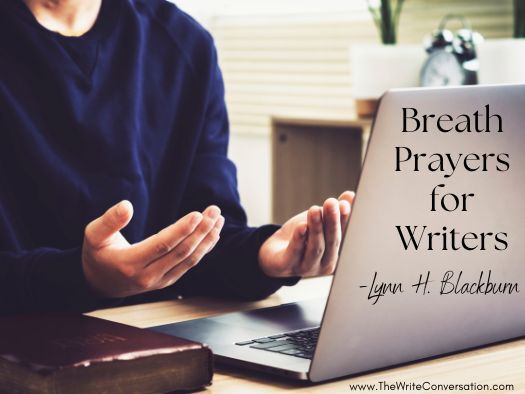
by Lynn H. Blackburn @LynnHBlackburn
You’d think, as writers, that we would have all the words.
But, as writers, we know better than anyone that sometimes words are hard.
We might struggle to find the words for any number of reasons.
We don’t live life in a vacuum, so the impact of family dynamics, busy schedules, illness, fatigue, work challenges…even the weather can twist us into knots and make it difficult to settle our brain so we can create.
And let’s not forget all the things that can stress us out about our writing. Deadlines, revisions, submissions, reviews…on any given day, our mind can run off the rails and into a spiral of anxiety and fear that can cripple our creative spirit.
When everything is piling on and taking me down, breath prayers have become a spiritual lifeline for me.
What is Breath Prayer?
Breath prayer is an ancient Christian practice that combines the natural rhythm of breathing with short scripture-based prayers. You inhale with one phrase, and exhale with another.
I’m a huge fan of breath prayer for every aspect of life, but today I want to share a few that are specific to writers and what writers face.
Breath Prayers for Writers
For When Creativity Runs DryInhale: My help comes from youExhale: Maker of heaven and earth
This breath prayer from Psalm 121:1-2 reminds us of the ultimate source of all creativity. As writers, we sometimes forget that we serve the original Creator who spoke worlds into existence. This prayer shifts the focus from our own limited resources to the infinite imagination that belongs to the One who piled high the mountains, scooped out the oceans, and painted the sunsets.
For Peace Before DeadlinesInhale: Not by might, not by powerExhale: But by Your Spirit, Lord
When deadlines loom and pressure mounts, it's easy to rely solely on our own strength and determination. This breath prayer, drawn from Zechariah 4:6, reminds us that our most meaningful work doesn't come from frantic striving or anxious effort. Instead, it flows from surrendering to God's Spirit working through us.
For Courage to Submit Your WorkInhale: You do not give Exhale: A spirit of fearInhale: You give a spirit ofExhale: Power, love, and self-control
Hitting "send" on a submission can be one of the most vulnerable moments in a writer's journey. This breath prayer, based on 2 Timothy 1:7, addresses the fear that often accompanies sharing our work with editors, agents, or readers. When self-doubt whispers that our writing isn't good enough or that rejection is inevitable, this prayer reminds us that timidity doesn't come from God.
For When We Feel InadequateInhale: Your grace is all I needExhale: Your power works best in weaknessInhale: When I'm weakExhale: Then I'm strong
As writers, we often encounter moments when we feel completely inadequate for the task before us. This prayer reminds us that our writing journey isn't about showcasing our own talents but about allowing God to work through our willing hearts—including and especially when we feel most insufficient.
These are just a few examples of prayers I use. The next time you feel overwhelmed by the writing journey, give breath prayers a try. Inhale God's truth, exhale your trust in Him, and watch how He works through your words and your waiting.
Do you practice breath prayers? Do you have a favorite verse you pray over your writing? I’d love to hear it!
Grace and peace, Lynn
TWEETABLEBreath Prayers for Writers from @LynnHBlackburn on @EdieMelson (Click to Tweet)
 Lynn H. Blackburn is the award-winning author of Unknown Threat, Malicious Intent, and Under Fire, as well as the Dive Team Investigations series. She loves writing swoon-worthy southern suspense because her childhood fantasy was to become a spy, but her grown-up reality is that she's a huge chicken and would have been caught on her first mission. She prefers to live vicariously through her characters by putting them into terrifying situations while she's sitting at home in her pajamas! She lives in Simpsonville, South Carolina, with her true love, Brian, and their three children. Learn more at www.lynnhblackburn.com.
Lynn H. Blackburn is the award-winning author of Unknown Threat, Malicious Intent, and Under Fire, as well as the Dive Team Investigations series. She loves writing swoon-worthy southern suspense because her childhood fantasy was to become a spy, but her grown-up reality is that she's a huge chicken and would have been caught on her first mission. She prefers to live vicariously through her characters by putting them into terrifying situations while she's sitting at home in her pajamas! She lives in Simpsonville, South Carolina, with her true love, Brian, and their three children. Learn more at www.lynnhblackburn.com.
Published on March 05, 2025 22:00
March 4, 2025
Fatal Flaws: Not Just for Characters We Write

by Sarah Sally Hamer @SarahSallyHamer
We writers use fatal flaws to describe how our characters deal with their arcs. Most characters, at least major ones, have arcs where a character is presented with a problem and, after a lot of lumps and bumps, finally makes a change that allows them to meet their goal. The hero/ine's journey is the basic structure that allows and explains those arcs, making characters interesting and relatable. But have you ever thought about where the concept of fatal flaws comes from?
Characters are built on humans. Writers often create characters based on their own knowledge and experiences and find familiar traits in their own lives to write about. But do humans actually have fatal flaws? Or is it just our characters who learn those lessons?
Even if we aren’t physically threatened, sometimes it’s hard to acknowledge there could be something “wrong” with us. After all, most of us manage our lives pretty well. We support ourselves on some level and create families and friends of all different sorts. But, often, we work with levels of emotion that may only occur when we’re really stressed. Road rage is a good example. When another driver does something we think is dangerous and downright stupid, we can explode with anger that seems to come from nowhere. People have even been killed over things that really didn’t matter in the long run.
Why does that happen? Where do those emotions come from? And how do they get so far out of control? And how can we use our own flaws to write amazing stories?
Writers create characters who explode or fight or run away or any other emotion all the time. We also build stories around personalities of every sort, giving them distinct character traits and allow them to react to situations. We sometimes take those characters from people we know. Jane Austin, for instance, used her observations and understandings of the relationships around her to populate her stories with characters who were prejudiced or full of pride. She herself never married but we can possibly see how her interaction with Tom Lefroy, who was forced to marry someone else for money instead of love, could have influenced some of the characters she created. Charlotte Bronte’s two older sisters died from complications of tuberculosis contracted at a boarding school they attended, in a very similar way to the way Helen Burns did in Jane Eyre.
But it’s not just about the stories we write. We all have fatal flaws of some sort, good and bad. (Even what we consider good traits can cause problems when they are applied incorrectly.) These flaws often come from experiences we had as children where things that happened in our “little lives” wounded us to some degree or another, and we create traits associated with those events. Then, when we’re triggered by an event, like another driver “stealing” our parking place, we can react in a manner that is outside of our normal. Characters react that way too.
An example is Paul Atreides from the books/movies of Dune. His father, the Duke, taught him to be honorable. But his father is murdered and he and his mother must flee for their lives. They have adversaries on both sides—the Harkonnens, who killed his father to control the Spice, and the Fremen, who want freedom to make their desert world into a green paradise. Paul’s idea of honor is valuable to the Fremen but both he and his mother have deep secrets, some that were planted centuries before. So Paul is forced to go against his honorable character trait, carefully walking a path of deceit and trust to both survive and to reach his goal of avenging his father’s death and saving the love of his life.
His fatal flaw is that he breaks his own moral rules and allows millions to die, to forward his own agenda. And that’s just in the first book! (Well, in the first and second most recent set of movies.) More to come in the next movie when we get to see the results of his broken vows.
The reason I love to analyze books and movies and the characters who inhabit them is that we often get to see those characters, who have very human failings, struggle with their beliefs and their morality. Which gives us the ability to look deep within ourselves. The opportunity to determine what is preventing us from finding the joy in our life may be something that happened so long ago we don’t remember but, as adults, we no longer have to be afraid of looking at and embracing our flaws. And using them in our stories. By giving our characters fatal flaws, we can create magical, well-rounded stories.
Which one of your fatal flaws can you use to create characters?
TWEETABLEFatal Flaws: Not Just for Characters We Write from @SarahSallyHamer on @EdieMelson (Click to Tweet)
 Sarah (Sally) Hamer, B.S., MLA, is a lover of books, a teacher of writers, and a believer in a good story. Most of all, she is eternally fascinated by people and how they 'tick'. She’s passionate about helping people tell their own stories and has won awards at both local and national levels, including two Golden Heart finals.
Sarah (Sally) Hamer, B.S., MLA, is a lover of books, a teacher of writers, and a believer in a good story. Most of all, she is eternally fascinated by people and how they 'tick'. She’s passionate about helping people tell their own stories and has won awards at both local and national levels, including two Golden Heart finals.A teacher of memoir, beginning and advanced creative fiction writing, and screenwriting at Louisiana State University in Shreveport for over twenty years, she also teaches online for Margie Lawson at www.margielawson.com and for the No Stress Writing Academy at https://www.worldanvil.com/w/classes-.... Sally is a free-lance editor and book coach, with many of her students and clients becoming successful, award-winning authors.
You can find her at info@mindpotential.org
Published on March 04, 2025 22:00
March 3, 2025
Learn the Craft of Writing: The Three Lives of Third Person POV
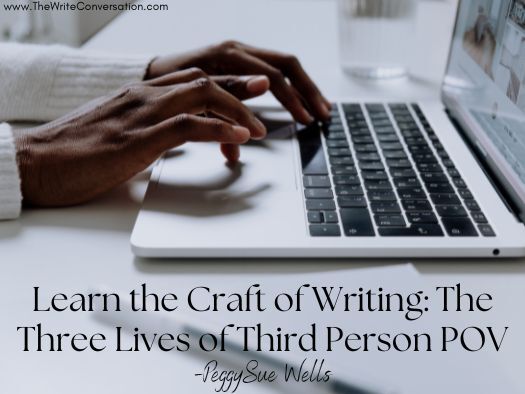
by PeggySue Wells @PeggySueWells
Third Person POV is characterized by pronouns He and She, They, and It.
In the Third Person point of view, the author tells the story of different characters. The story unfolds through the POV of one character at a time.
When using more than one character to tell the story, the author does not need to vary the chapters equally, or always bounce from the hero to the antagonist and back again every other chapter. Instead, the author is free to tell the story in the most compelling fashion. The reader is not counting which character has the most chapters in their POV.
The reader trusts the author to engage the reader by evoking emotion. Chapters told from the view point of the character who has the most to lose are filled with suspense. Conflict equals suspense and suspense is key for a compelling story. For my books, that means each chapter is written from the POV of the character who has the most to lose in that scene.
Additionally, this perspective is divided into Third Person Limited POVThird Person Objective POVThird Person Omniscient POV
A popular example of this perspective is the Lord of the Rings trilogy by JRR Tolkien and the Harry Potter series by JK Rowling. In Rowling's stories, the reader has access to scenes across time and space, but the reader is only ever in the head of Harry Potter himself.
In my novel Chasing Sunrise, most chapters are written from the Third Person Limited POV of the hero, Michael Northington. Some chapters are written from the Third Person Limited POV of the heroine, Elise Eisler.
In this excerpt from Chasing Sunrise, the reader sees the action from Michael's POV.
Chasing Sunrise
Hurry up and wait was the military’s motto. On this day Michael’s squadron had stood in formation on the base’s grassy parade grounds. Under the merciless heat of the afternoon sun, Michael felt like an egg in an iron skillet.
The unit commander liked everyone in alphabetical order. That placed Bryce slightly in front and to Michael’s left. To his right, the sun gleamed off the empty aluminum bleachers. The only other objects that broke up the monotony of the open field were a pathetic clump of three scraggly trees with barely ten leaves between them. They were too thin to cast a shadow, let alone offer some shade.
He estimated they had fried there for an hour when the commanding officer returned, a cold drink in his hand. “Your instructor for this afternoon has been delayed,” the CO announced.
No kidding. Michael fought the urge to roll his eyes.
“He should arrive anytime.” After finishing his soda in front of the sweltering men, the commanding officer strode over to the empty bleachers and sat.
Maintaining military bearing, Michael felt the sweat drip down his back. Somewhere behind him a man threw up. That caused the guy next to Michael to throw up. The chunky, vile-smelling vomit splashed on Michael’s boot.
Chunks. I hate chunks.
Still the group stood at attention.
During the next hour, the smell of sunbaked barf filled the air. A guy in front passed out and fell to the ground. Two others threw up. Unpleasant as those events were, Michael thought the distractions at least made the wait go faster.
Then Michael saw Bryce’s head move—barely perceptible, but his friend had spotted something to the left. Moving only his eyes, Michael glanced that way. Unfolding out of the wiry trees was a soldier, camouflaged to blend perfectly with his sparse environment.
He dropped from the tree without a sound and walked to the front of the unit. Michael inwardly groaned. This clown had sat frozen in a cramped position for more than two hours with virtually no cover and none of these experts in training had detected him.
The CO got up from his seat on the bleachers and met the stranger in front of the men. They shook hands.
“Ladies,” the CO yelled, “this is Major Corbin MacIntyre. I think you can learn a thing or two from him.”
Stories in Third Person
Books in Third Person POV includeThe Jack Reacher series by Lee ChildSecrecy Order by PS WellsUnnatural Cause by PS WellsHomeless for the Holidays by PS Wells
Third Person Limited POV can be shared strictly from one character's telling of the story. Or Third Person Limited POV can encompass more than one character's viewpoint as long as the author stays in the head of only one person at a time.
TWEETABLELearn the Craft of #Writing: The Three Lives of Third Person POV from @PeggySueWells on @EdieMelson (Click to Tweet)
 PeggySue Wells is the award-winning USA Today and Wall Street Journal bestselling author of 45 books including the mystery suspense title of the year, Unnatural Cause.
PeggySue Wells is the award-winning USA Today and Wall Street Journal bestselling author of 45 books including the mystery suspense title of the year, Unnatural Cause. Action and adventure, romantic suspense, military romance, and cozy mystery are the page-turning novels by P.S. Wells including Chasing Sunrise, Homeless for the Holidays, and The Patent. How to live better, easier, and simpler is the focus of her nonfiction including The Ten Best Decisions A Single Mom Can Make.
PeggySue is a frequent guest with media including Focus On The Family, Family Life Today, and Christian Product Expo. She regularly teaches at conferences including Write To Publish, Taylor University Writers Conference, Kentucky Christian Writers Conference, and the Advanced Writers and Speakers Association. Collaborator on multiple titles including books with Dr. Benjamin Hardy, Shemane Nugent, Pat Palau, and Pam Farrel, PeggySue is a writing coach. When not writing, she parasails, skydives, snorkels, scuba dives, rides horses, and has taken (but not passed) pilot training. Founder of SingleMomCircle.com, connect with PS Wells at www.PeggySueWells.com, on Facebook at PeggySue Wells, and LinkedIn at linkedin.com/in/peggysuewells
Published on March 03, 2025 22:00
March 2, 2025
Writing Conference Season Is Here: Begin with Prayer
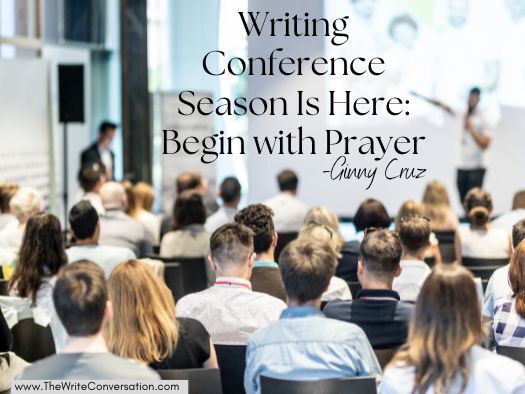
by Ginny Cruz, MPA, PT
The 2025 writers' conference season is here. Some of you may be pondering whether to attend, while others may feel led to a conference but are unsure which one. Let me encourage you to ask God for your answers, whatever your circumstances.
I have written since 2007. His call to write was clear, but the content and the direction were out of focus. Over time, having many submissions critiqued by my Word Weavers groups and attending conferences where I felt like a fish out of water, my audience and purpose have come into focus. Without the relationships with writers I met at conferences and critique groups, my reach and impact would likely be much smaller.
While your journey is unique, I humbly suggest you pray over every decision during this upcoming conference season.
5 Prayers for Your Writing Journey
1. Pray for strength. As a physical therapist, I have assisted many in gaining the strength to walk when they had given up believing it was possible. One thing that kept them moving forward was holding my hand and believing in my strength rather than their own. My fears about my writing often cause me to grab God’s hand and lean on His strength to move forward, just like my former patients leaned on me. Never has He failed. If you feel unready to attend a conference, ask God for strength.
2. Pray for godly counsel. Surround yourself with fellow writers who know your writing and your heart. Listen to their advice. Many of them will be God’s messengers sharing His guidance for you. When attending a conference, meet people. Ask God whom to speak with and listen to their guidance. The advice you receive may be for your current situation or a future season of your journey. Nothing is ever wasted. Pray for godly friends and advisers.
3. Pray for humility. An important lesson I have learned is that my writing always needs editing. And the content may not be what God intended. Sometimes, what is written is what I want to say. While accepting correction is painful, it is easier when my heart desires God’s message to shine forth. The first draft is never the best. Ask God for a humble heart.
4. Pray for boldness. Writing that moves a reader’s heart requires us to expose our weaknesses, failings, and fears. I have found it comfortable to be bold when my words are impersonal and do not cause an emotional reaction. But those words rarely move hearts. Peeling back the layers of protection we shield ourselves with requires confidence. Expert feedback at a conference will help you know if your writing moves hearts. Ask God for boldness.
5. Pray for patience. Jesus prepared for a long time, for a few years of public ministry. Think about all He achieved in a couple of years. You, too, may have a long season of preparation before a period of power. I have discovered that developing patience is difficult. But I tell myself, if Jesus can do it, so can I. The writing journey is more like the tortoise than the hare. Ask God for patience.
My advice for anyone considering attending a conference is to go. If you wait to be good enough, you may never feel ready. Go anyway. Faith is going without knowing all the answers. If God has placed the fire in your heart to go, then say yes. Please do not allow fear to smother that fire. Cover every decision with prayer and go forth boldly, holding God’s hand. He will provide everything you need. He has for me.
What conferences are you considering this year?
TWEETABLEWriting Conference Season is Here: Begin with Prayer - insight from Ginny Cruz on @EdieMelson (Click to Tweet)
 Ginny Cruz, MPA, PT is a pediatric physical therapist, early intervention specialist, and award-winning author. Her writing encourages and teaches moms simple and effective ways to help their baby meet developmental milestones. In addition to writing, she enjoys hiking, reading, and camping with her husband. Find out more at ginnycruz.com, Instagram, or Facebook.
Ginny Cruz, MPA, PT is a pediatric physical therapist, early intervention specialist, and award-winning author. Her writing encourages and teaches moms simple and effective ways to help their baby meet developmental milestones. In addition to writing, she enjoys hiking, reading, and camping with her husband. Find out more at ginnycruz.com, Instagram, or Facebook.
Published on March 02, 2025 22:00
March 1, 2025
Spiritual Practices for Writers: The Practice of Hoping
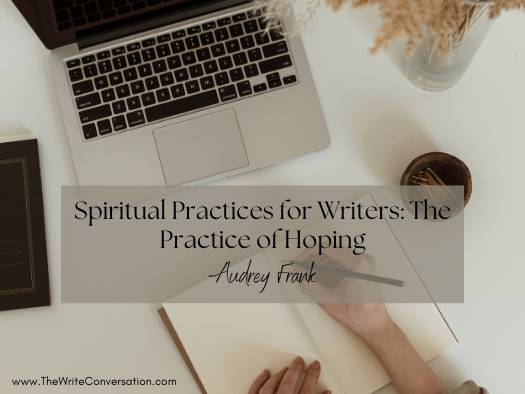
by Audrey Frank @AudreyCFrank
Join me the first Sunday of each month this year as we examine twelve spiritual practices for writers.
So, since we have such a hope, we act with great confidence (2 Corinthians 3:12, CEB).
What is the Christian writer’s hope?
We must consider our hope in the context of our qualification.
Some of us have degrees in journalism, creative writing, or publishing. Others have a laptop and a dream. Some writers are published; some are not. What qualifies the writer who follows Jesus?
This is the confidence that we have through Christ in the presence of God. It isn’t that we ourselves are qualified to claim that anything came from us. No, our qualification is from God. He has qualified us as ministers of a new covenant, not based on what is written but on the Spirit, because what is written kills, but the Spirit gives life (2 Corinthians 3:4-6, CEB).
Our true confidence isn’t that we ourselves are qualified to claim that anything came from us. No, our qualification is from God. He has qualified us as ministers of a new covenant, one with words that give life through His Spirit.
Our degrees (I have three of them) do not grant us confidence before God. Our rejected manuscripts (I have many more than three of those) cannot prevent us from having confidence before God.
So where is your hope today?
The practice of hoping is futile on a lousy day and temporary on the best day if the source of our hope is ourselves. God has qualified us, Christian writers, as ministers of a new covenant that uses living words written by the Spirit of God. Think about that for a moment.
Our Word-Giver is the Word Himself (see John 1 ). Unlike Moses, we do not schlep stones up and down a mountain (however heavy our laptops may be). We are Christ’s letter, written on human hearts. (See 2 Corinthians 3:1-3) We were written by the Spirit of the living God. And this is our confidence and qualification to join Him in the continuing, glorious work of writing Christ on human hearts today.
The practice of hope begins each day with the right perspective. The hope of the Christian writer is in the finished work of Jesus. We have confidence through Him in the presence of God each morning. We remind ourselves as we sit down to write that today’s achievement is not because we are qualified to claim that anything came from us. No, our qualification is from God. His words give life, and we are His ministers of those life-giving words.
For the next month, try this:
Write the words of 2 Corinthians 2:4-6 and display them in your writing space. Before you begin to write each day, use the framework of confidence and qualification in this passage and practice hope.
I wonder what you will write with such unshakable confidence?
Let me know!
Lord, refine my hope. Strengthen my confidence in the fact that my qualification is from You. And give me the will and the inspiration to write words that bring life. Amen.
TWEETABLESpiritual Practices for Writers: The Practice of Hoping from @AudreyCFrank on @EdieMelson (Click to Tweet)
Don't Miss The Other Spiritual Practices for Writers! JANUARY: THE PRACTICE OF PLANNING FEBRUARY: THE PRACTICE OF TRUSTING MARCH: THE PRACTICE OF HOPING
 Audrey Frank is an author, speaker, and storyteller. The stories she shares are brave and true. They give voice to those whose words are silenced by shame, the hard things in life that don’t make sense, and the losses that leave us wondering if we will survive. Audrey and her family have spent over twenty years living and working among different cultures and world views, and she has found that God’s story of redemption spans every geography and culture. He is the God of Instead, giving honor instead of shame, gladness instead of mourning, hope instead of despair. Although she has three different degrees in communication and intercultural studies, Audrey’s greatest credential is that she is known and loved by the One who made her.
Audrey Frank is an author, speaker, and storyteller. The stories she shares are brave and true. They give voice to those whose words are silenced by shame, the hard things in life that don’t make sense, and the losses that leave us wondering if we will survive. Audrey and her family have spent over twenty years living and working among different cultures and world views, and she has found that God’s story of redemption spans every geography and culture. He is the God of Instead, giving honor instead of shame, gladness instead of mourning, hope instead of despair. Although she has three different degrees in communication and intercultural studies, Audrey’s greatest credential is that she is known and loved by the One who made her.Audrey is the author of Covered Glory: The Face of Honor and Shame in the Muslim World (Harvest House Publishers), an outpouring of Audrey’s heart to introduce others to the God of Instead. Shame is not unique to the developing world, the plight of the women behind veils, young girls trafficked across borders; shame is lurking in hearts everywhere. Through powerful stories from women around the world, Covered Glory illuminates the power of the Gospel to remove shame, giving honor instead. Available at favorite booksellers: BARNES & NOBLE, BOOKS A MILLION, AMAZON.
Published on March 01, 2025 22:00
February 28, 2025
Tips for Getting Your Writing in Publishable Condition
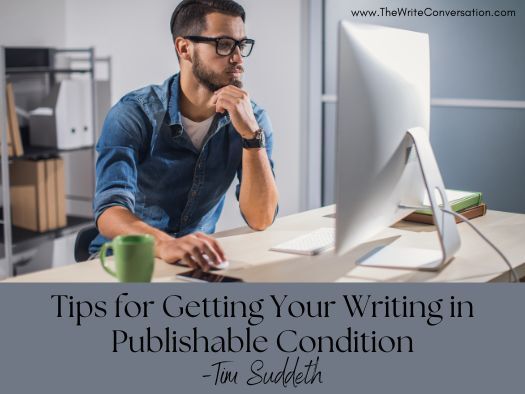
by Tim Suddeth @TimSuddeth
I’m in the middle of editing one of my novels. And, honestly, I feel totally lost. After I finished the manuscript a few years ago and sent it out to agents with several rejections, I decided to give it another look. I’ve edited it and other books, but this is the first time I’ve returned to a story after a couple of years. To say my memory of it is a little fuzzy is an understatement. I really thought it was ready, but now I can see I have a lot of work ahead of me.
My first step after the last rejection was to send it to a developmental editor. When her comments came back, I realized I had a roaring dumpster fire on my hands. There were entire scenes that had to be tossed and character motivations that needed to be made clearer. How did I send this out with my name on it, thinking it was complete?
Let’s look at some lessons I’m learning about getting your work ready, so you won’t make the same mistakes.
1. Before you send out the baby you’ve worked so hard on, and put so much time into, get another writing professional to look at it. (I was going to say get professional help, but that’s another post.) Critique groups are wonderful, but they can only help you so much. When you’re trying to get published, or self-published, you need to find someone who knows what the finished product should look like in the genre you are writing.
Nonfiction and fiction books have different expectations (not rules) and standards. And readers of fiction are looking for a specific experience according to the genre. You may get away with a 125,000-word fantasy, but not in a cozy mystery or Young Adult. (Unless you’re J. K. Rowling. You’re not. And this is your first book.) Find someone knowledgeable about your readers’ and publishers’ expectations.
I sent my story to a freelance editor/author/teacher I’d met at a mystery writers’ conference. I’d sat in some of her classes and learned who she’d worked with. When I got her edits (after storming out of the house and stomping around the neighborhood), I could look back through them with confidence in knowing that she knew what I needed to do make my story better
2. Whatever you put into your story has to be WRITTEN DOWN onto the page. Just having a picture in your head of the French divan that your main character is lounging upon doesn’t mean that your reader won’t think they are slouching in an armchair unless you write it in explicit detail. The editor kept asking why characters were acting certain ways. She said it seemed like I knew why, but it wasn’t on paper.
That’s a part of your story that is so hard to self-edit. You know that your character is older and doesn’t like to drive at night because it’s hard for her to see. You have the video running in your head. But if you have her refusing to pick up her grandson and you haven’t mentioned her fear, your reader is left asking why your character doesn’t care for her family.
What’s in your head isn’t the story your reader is slogging through, I mean, embracing with joy and has them enthralled. The story they’re experiencing is only what’s on paper. Not in your head. And it’s our job to make these two as close to each other as possible.
3. Fixing the book will not be a quick job. My poor manuscript, which is a wonderful story with terrific characters, I think, is laying in my laptop like a disassembled chevy in the backyard of a car enthusiast. I’m still picking the carcass apart before I’ll tenderly piece it back together, adding additional parts and getting rid of those that no longer work.
Is it worth it? Did I tell you what a wonderful plot it is and what a terrific cast of characters it has? And I know you’ll love the heroine.
4. You may have to cut out some scenes and dialog you think is so witty, but that doesn’t contribute to your story. And it’s this story that is most important. They call it killing your darlings. Some writer-of-old said that when you’re reading along and you find a piece of writing of your own that you really like, you should take it out.
I think that’s harsh. They are my darlings for a reason. I’m hoping my readers will enjoy them as much as I do.
When I do cut a part out of the story that I liked, it’s not so sad. They are still whirling around inside my little brain. And I wonder if, sometime in the future, they might pop up in another story.
You often hear that writing is rewriting. That the first draft gives you the building blocks you will need to build with. It’s in the subsequent drafts that the true story takes shape.
The problem I’m now having is that I don’t know how many additional drafts it’s going to take. I mean, it is my baby, but I feel like it’s getting about time it left the coop. But I know it will take at least one more draft. My story deserves that.
Do you have any editing tips to share with me? I need help to get my masterpiece reassembled and polished.
TWEETABLETips for Getting Your Writing in Publishable Condition from @TimSuddeth on @EdieMelson (Click to Tweet)
 Tim Suddeth is a stay-at-home dad and butler for his wonderful, adult son with autism. He has written numerous blogs posts, short stories, and three novels waiting for publication. He is a frequent attendee at writers conferences, including the Blue Ridge Mountain Christian Writers Conference and a member of Word Weavers and ACFW. He lives near Greenville, SC where he shares a house with a bossy Shorky and three too-curious Persians. You can find him on Facebook and Twitter, as well as at www.timingreenville.com and www.openingamystery.com.
Tim Suddeth is a stay-at-home dad and butler for his wonderful, adult son with autism. He has written numerous blogs posts, short stories, and three novels waiting for publication. He is a frequent attendee at writers conferences, including the Blue Ridge Mountain Christian Writers Conference and a member of Word Weavers and ACFW. He lives near Greenville, SC where he shares a house with a bossy Shorky and three too-curious Persians. You can find him on Facebook and Twitter, as well as at www.timingreenville.com and www.openingamystery.com.
Published on February 28, 2025 22:00
February 27, 2025
To Capitalize or Not to Capitalize: Exploring the Deity Pronoun Question
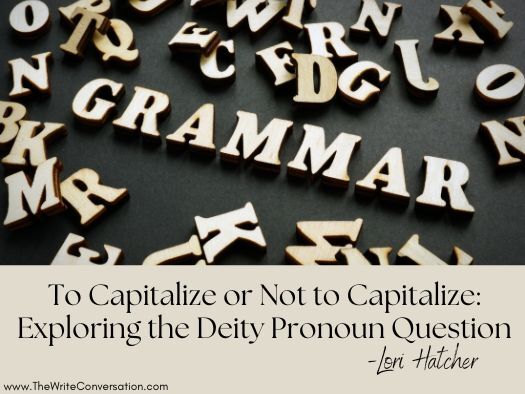
by Lori Hatcher
Early in my publishing career, I noticed that some writers capitalized deity pronouns (pronouns referring to God) and some did not. Why? Which is correct? Should He and other pronouns be capitalized when referring to God? Let’s explore the question today.
A Sign of Reverence
Many think capitalizing the first letter, H in he, and in other pronouns like you, him, and his when referring to God shows reverence. This is an honorable motive, but English grammar uses capitalize letters to differentiate between a proper noun and a common noun. We capitalize Satan to acknowledge that Satan is a proper noun/name, certainly not to show him reverence.
Because the Bible Does It—Not!
Surprisingly, most translations, even the oldest ones, don’t capitalize deity pronouns. Most religious publishers have adopted the lowercase style to conform to the most commonly used versions of the Bible (the King James Version, the New International Version, the Revised Standard Version, and the English Standard Version).
The translators’ goal is to avoid adding a layer of interpretation to the translation. They seek to accurately represent the original manuscripts, which do not mark divine pronouns (all Hebrew letters are the same height.) Currently, only the NKJV, NASB, and HCSB (but not the new CSB revision) capitalize the pronouns for God.
To Clarify
Some capitalize to avoid confusion of antecedents in a closely written text (for instance, whether the text is referring to Jesus or one of his disciples). In most cases, a careful writer can make the reading clear by rearranging or rewording the sentence.
To Accurately Reflect Quotations
Because the capitalization of deity pronouns came into fashion in late nineteenth- and early twentieth-century publishing, you may encounter a quote that capitalizes divine pronouns. If you use the quoted material, you must retain the original capitalization.
To Reflect the Bible Translation
If you quote from a Bible translation that uses uppercased deity pronouns, you must reproduce the verse or passage exactly as it is written. To change it, as with most other changes, would violate the copyright.
To Reflect Your Personal Preference
If you’re self-publishing your books, articles, blog posts, or devotions, you have the freedom to choose whether to uppercase or lowercase your deity pronouns. But you must be consistent. Pick one style and stick with it throughout the entire project. Waffling between the two will make your writing look amateurish, confuse your readers, and muddy your message.
To Reflect the Style Guide
As of this writing, no English style guide says to capitalize divine pronouns. Not The Chicago Manual of Style or even The Christian Manual of Style, the publishing guide most Christian publishers use.
To Follow Your Publisher’s Style Guide
While each publisher primarily follows the guidelines established in The Chicago Manual of Style and The Christian Manual of Style, they’re free to establish their own standards. Some publishing houses allow writers to choose their preference, as long as they use it consistently throughout, while others require across-the-board adherence to their style guide. If your preference or conviction conflicts with a publisher’s style guide, you may need to choose another publisher.
To Reach a Younger Audience
Because the capitalization of divine pronouns was the predominant style of late nineteenth- and early twentieth-century publishers, using it can give a book a dated or Victorian feel. This could be off-putting to modern day readers who might otherwise gain great value from your book.
To Capitalize or Not to Capitalize?
I hope this journey into the whys and whats of deity pronoun capitalization has helped you think through your preference (if you have one) and better understand the question. Ultimately, you must weigh the information, seek God for wisdom (James 1:5), and decide how best to use your words (and the rules that guide them) for God’s glory.
Your Turn
Now it’s your turn. Respecting that each writer must seek to do what they think is best in their writing, do you capitalize or lowercase divine pronouns? Why?
TWEETABLETo Capitalize or Not to Capitalize: Exploring the Deity Pronoun Question from author Lori Hatcher on @EdieMelson (Click to Tweet)
For Further Reading:The Christian Manual of Style, pages 169–170“Should We Capitalize Divine Pronouns? Monday with Mounce”
https://zondervanacademic.com/blog/sh...
 Lori Hatcher is a freelance editor, writing instructor, and author of six devotionals with Our Daily Bread Publishing. Her latest book, Think on These Things: 60 Thoughtful Devotions for Renewed Peace, released this month. Lori writes for Revive Our Hearts, Focus on the Family, The Upper Room, and Crosswalk.com. A frequent instructor at writers conferences around the country, Lori loves nothing better than helping other writers polish and perfect their craft. Connect with her at www.LoriHatcher.com.
Lori Hatcher is a freelance editor, writing instructor, and author of six devotionals with Our Daily Bread Publishing. Her latest book, Think on These Things: 60 Thoughtful Devotions for Renewed Peace, released this month. Lori writes for Revive Our Hearts, Focus on the Family, The Upper Room, and Crosswalk.com. A frequent instructor at writers conferences around the country, Lori loves nothing better than helping other writers polish and perfect their craft. Connect with her at www.LoriHatcher.com.
Published on February 27, 2025 22:00
February 26, 2025
The Birth of a Character
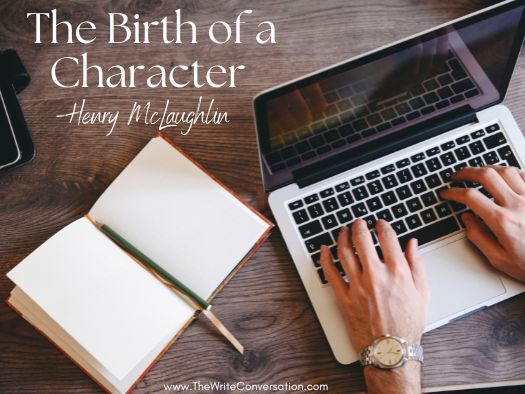
by Henry McLaughlin @RiverBendSagas
People have asked where my characters come from. My response frequently is, “I don’t know. He just showed up one day and said he had a story to tell.”
That’s how Michael Archer, the protagonist of my Riverbend series, came to be.
The first glimmer of book one, Journey to Riverbend, came, like most of my story ideas, from an image. There was a guy standing on a ridge looking into a valley. The sun was setting. He wore a cowboy hat and held the reins to a horse. OK, I thought, it’s a western. I like westerns. Other than that, he was a dark silhouette, a mysterious shadow.
I said to myself, “Who is he and why is he standing there?” At that moment, I took my first step as writer. I met my first character.
I didn’t know much about the craft, especially about creating characters. I just knew I had to write. So, I jumped in with both feet. Of course, the water was over my head.
But I had enough sense to get to know Michael and what his story was.
He was in his late twenties and had lived a prodigal life before coming to know Jesus. In an almost Inigo Montoya voice, his told me, “My name is Michael Archer and I believed I killed my father.”
He told about his early childhood on a farm in Southern New England. Not a prosperous farm because his father was a drunk and abusive to Michael, his sister Ellie, and their mother. One day, at age 13, Michael caught his father molesting Ellie. He defended his sister with a pitchfork and stabbed his father. He ran away leaving his father gushing blood. His sister ran to a neighboring farm. His mother was dead on the kitchen floor after another beating from her husband.
Michael drifted into a life of alcohol, gambling, and violence. He was becoming just like his father. Except he hated farming. Until…he was sitting in a jail cell in a small town in Missouri after another night of drinking and fighting. The town minister visited him and led him to Jesus. This is much condensed version of Michael’s conversion experience which took several visits from the preacher often with the risk of a punch in the nose, or worse.
In learning the craft, I’ve come across and tried to use various tools to build characters. I’ve used Meyer-Briggs and other personality trait systems. I’ve completed detailed questionnaires. These I found to be frustrating because they took a lot of time to fill out and yielded a lot of information I never used.
The system that works best for me is what I used with Michael. I let him tell me his story. I’ve added some questions to get deeper into his motivations.
Questions to Dig Deeper into a CharacterWhat is the character’s primary story goal?Why? What will the character do if he or she doesn’t achieve this goal?What are the character’s core values?
As I write the story, I look for ways to bring these values into conflict, so the character must make a choice between two good values at the climax.
At the climax of Michael’s story, I had him face a conflict of two of his core values:He would always keep his wordHe would never kill anyone.
To keep his word to a character early in the story, he face the possibility of having to kill someone.
One of the best questions I found is, How will this character face death?
I discovered this question while learning from James Scott Bell through his books and workshops.
Of course, Michael couldn’t tell me how he was going to face death. It was never on his mind that he would die.
Death can take forms besides physical death. And it can draw from real life. We all face death in the shape of psychological death, emotional death, professional death, death of a relationship, and, for a Christian, dying to self.
Another key component for me to bring a character to life is to expect surprises from the character as the story moves along.
When I let the character tell the story, he reveals more about himself. Stuff not shown earlier or in the preparation of the story material. For me, this makes the character alive, not bland information on a sheet of paper or in a form or chart. The character is more human because he or she has the opportunity to do something unexpected. If it surprises me, it will surprise the reader and make the story more dynamic.
What are some things you’ve found useful in bringing your characters to life?
TWEETABLEThe Birth of a Character from author Henry McLaughlin (@RiverBendSagas) on @EdieMelson (Click to Tweet)
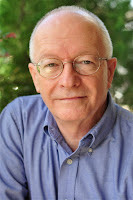 Henry’s debut novel, Journey to Riverbend, won the 2009 Operation First Novel contest.
Henry’s debut novel, Journey to Riverbend, won the 2009 Operation First Novel contest.Henry edits novels, leads critique groups, and teaches at conferences and workshops. He enjoys mentoring and coaching individual writers.
Connect with Henry on his BLOG, TWITTER and FACEBOOK.
Published on February 26, 2025 22:00



